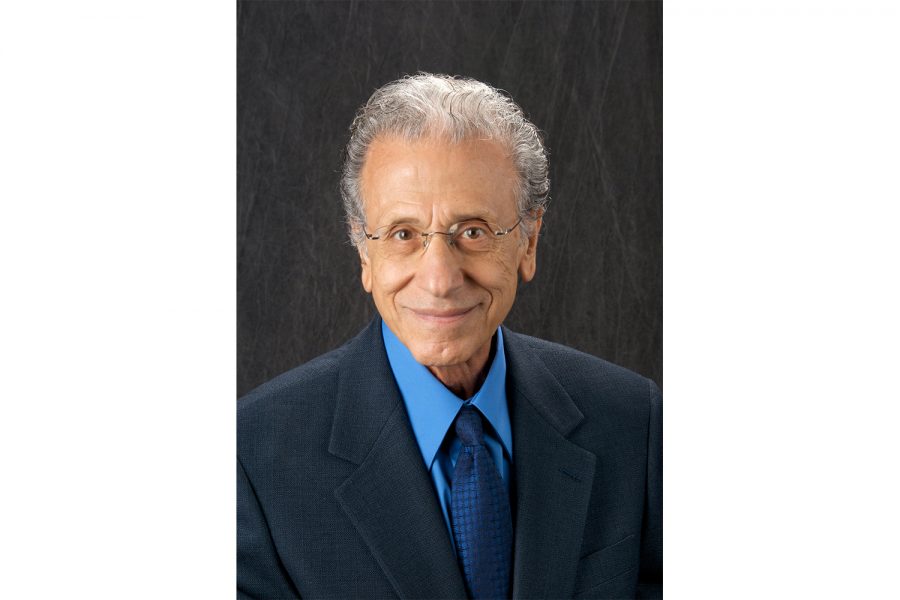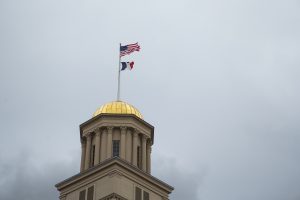Longest-serving faculty member, Francois Abboud, reflects on 60 years at the UI
The UI Cardiovascular Research Center founder talks about his decision to come to the university in 1960 and what has encouraged him to continue to practice medicine for the past six decades.
October 1, 2020
When University of Iowa professor Francois Abboud began teaching at the UI in 1960, he was not planning to stay for long. 60 years later, he is the UI’s longest-serving faculty member.
“My decision to stay at Iowa was the opportunity to develop major programs that were unparalleled anywhere,” Abboud said. “The culture of cooperation and the team interactions was a great opportunity for program development.”
Abboud has dedicated his life to the UI and cardiovascular research, saying medicine is “my life and my passion.” He has mentored many students and made important strides in cardiovascular medicine.
The professor founded the UI Cardiovascular Research Center in 1974 and served as the director until 2012. Since coming to the UI, he has served as the associate vice president for research, the Edith King Pearson Chair of Cardiovascular Medicine, and a professor of molecular physiology and biophysics in the Department of Internal Medicine.
He was born in Cairo, where he received his undergraduate and medical degrees. He moved to the U.S. in 1955 when he was 24 years old. He completed his residency in internal medicine and his cardiology fellowship in Milwaukee.
Abboud said he made the decision to come to the UI after a conversation he had with John Eckstein, former dean of the Carver College of Medicine.
Although the UI didn’t have any advanced facilities, Abboud said the way physicians cared for their patients, by getting to know them on a personal-level, stood out to him.
“I identified with the priorities and values,” he said. “The sense of commitment to patients was really what made me decide to come to Iowa City.”
RELATED: Carver College of Medicine Hawkeyes provide services for health care workers
As a researcher of medicine, he was impressed by the university’s commitment to helping patients and making important developments in his field.
He also stayed because of the work he could accomplish with other departments at the UI.
“The opportunity to develop a team from various departments who share a common interest in cardiovascular research was unusual.” Abbound said. “The ease in which you can develop a team of scientists with different expertise was fantastic and rewarding here.”
He added that he could focus on the research that was important to him, mainly focus were on improving cardiovascular function and reducing heart disease. Although he isn’t seeing patients anymore, he said he continues to research and mentor young faculty members and post-doctoral fellows.
Abboud has accomplished many things in his career, but he said he is most proud of the scientists he has trained.
Michael Welsh, director of the Pappajohn Biomedical Institute, was one of Abboud’s students in the early 1970s. Welsh said he completed his residency at the UI before moving to San Francisco. Abboud encouraged him to come back as an assistant professor in 1981.
“He cares about the people he takes care of,” Welsh said. “It was clear when he saw a patient that he had a direct interest in that human being. I feel very fortunate to have had Frank as my mentor to show me the way forward, to encourage me, and to support me over the years.”
Mark Chapleau, UI professor of internal medicine, moved to Iowa City to complete his postdoctoral training with Abboud in 1985. Although he looked at other universities and departments, Chapleau said he chose to come to UI because of the longtime professor.
“He keeps Iowa at the center of the universe,” Chapleau said. He spends a lot of time trying to do very good things for the university, recruiting people and keeping people here. He definitely puts a lot of effort into doing good for the university and the College of Medicine.”
RELATED: University of Iowa nursing professor Kathleen Buckwalter receives “Living Legend” honor
Not only did Abbound mentor Chapleau in his work, but he also took the time to get to know him and his family, Chapleau said.
“He’s a very generous and family-oriented person,” said Chapleau. “What stood out was his ability to flip from full speed ahead at work to complete relaxed social occasions. He has made life interesting and really enjoyable.”
Looking back on the 60 years he has dedicated to the UI, Abboud said he is proud of the legacy of physicians he has created.
“What gives me joy is the legacy I’ll leave with respect to young people whom I have mentored and trained over the last few decades,” the professor said. “My own passion is the privilege I had to spend the large part of my life with the mentees with whom I’ve trained here.”






